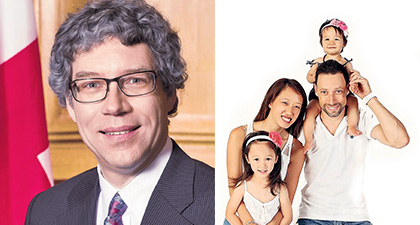Converts’ stories about their journey to join the Jewish People are as varied as the individuals themselves.
Whether the decision to change one’s religion and by extension one’s identity is triggered by the birth of a child or marriage to a Jewish partner or the result of individual exploration, it is not taken lightly, For many, it involves both heartache and a sense of homecoming.
Ashley, who is due to convert in Toronto this winter (and who declined to give her full name), studied a variety of religions before stumbling upon Judaism.
“I fell into discovering Judaism accidentally,” she said. “The more I read about it, the more it made sense.”
But when the 24-year-old told her family she was converting to Judaism, her formerly “not religious” parents began going to church and told her they were praying for her.
Raised in a community east of Toronto, she and her family didn’t know any Jews. “I guess it’s just foreign to them,” she said. As she studied in conversion class, she experimented with how observant she was going to be. “That was alarming for them,” she said.
The Jewish community, meanwhile, has been welcoming, she said. “I do get the question ‘Who’s the guy?’ and when they hear there’s no guy, they’re very excited,” she said. Still, she harbours some reservations that she won’t ever be fully accepted as a Jew. She notes that on applications for Jewish schools and camps, the question of whether an applicant’s mother is born Jewish is always required. “I do worry that if I have children, would they be discriminated against?”
Despite her concerns, choosing Judaism was the right decision, she says. “I felt like there was something missing always and now there isn’t.”
Russell Copeman, a Montreal city councillor and a former member of the Quebec National Assembly, began considering conversion when his first child was born to his Jewish wife, and he started to consider the implications of raising a child with two religions.
He converted while working in political life in Quebec City. “I had a couple of acquaintances who said it [conversion] would harm your political career. I never felt that. I never felt any prejudice or discrimination. People were very accommodating,” he recalls.
Educating potential converts and making synagogues more welcoming is something Rabbi Adam Cutler, who oversees conversions at Beth Tzedec Congregation, a Toronto Conservative shul, thinks deeply about. At his synagogue, a conversion support committee ensures that people in the process of choosing Judaism have someone to sit with at services and to invite them for holiday meals.
“I think we are a welcoming and inclusive place,” he said. “But we’re pretty white. Those who convert who aren’t white, I wouldn’t be surprised if they feel a sense of otherness.”
Jenn Soer, a second-generation Chinese-Canadian who converted to Judaism four years ago through the Conservative movement, agrees. She and her Jewish husband visited a number of shuls before finding one where they felt they belonged.
“I obviously don’t look Jewish. It was difficult at times,” she said. “Going to certain shuls, sometimes people would whisper.”
Older people who have seen with her children have on occasion assumed she was their nanny. “That hit me hard,” she said.
But both her husband’s and her own family were supportive of her conversion, which was easier than she had anticipated.
Today, with her little girls enrolled in a Hebrew-speaking daycare and Jewish after-school programs, she feels part of the community. “We’re surrounding ourselves with the right people, and we’re very comfortable,” she says.
Steve McDonald was raised in a Christian evangelical home, but wasn’t religiously observant when two life-changing events happened. “I met a Jewish girl and I went to Israel.”
McDonald, who was working in the Jewish community, studied with a Conservative rabbi and converted. “I spent a year studying and I fell in love with Jewish ethics.”
Conversion is the most contentious issue in Jewish life, tapping deep into the community’s fears about assimilation, he says. “People often look at the denomination you’re converted [with] and make a judgment. People have no concept of what the Halachah requires.”
McDonald’s Conservative conversion isn’t accepted in Israel, but that’s a matter for Israelis to decide, he says.“Overwhelmingly, the majority of Israelis welcome me if you say you’re Jewish and live a Jewish life.”
Erin Bolling, of Ottawa, began considering conversion when her son was born, but like McDonald, it was Judaism’s ethical values that ultimately attracted her. The final push came when she and her Jewish common-law husband discussed her elderly father moving in with them. Her partner said “the most important thing is to honour your parents. It just touched me deeply.”
Bolling converted two years ago, and while her father rejoiced with her, an uncle refused to attend her Jewish wedding.
“That’s life,” Bolling says. Her siblings have been very supportive of her new religious identity and attended pro-Israel rallies with her this summer.
“Sometimes people talk about having a Jewish soul. I really think that speaks to me. Judaism makes me feel at home.”
